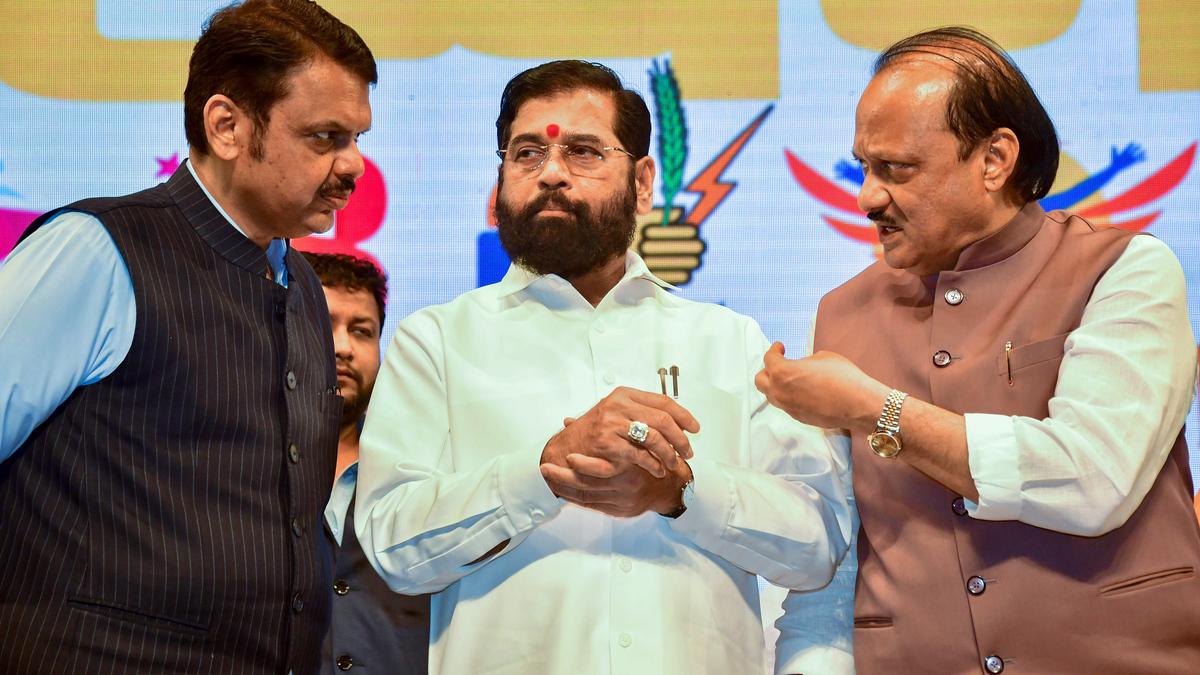Mahayuti Alliance In Maharashtra
(L to R) Deputy CM Devendra Fadnavis, CM Eknath Shinde and Deputy CM Ajit Pawar | .
Maharashtra Chief Minister Eknath Shinde and both Deputy Chief Ministers Devendra Fadnavis and Ajit Pawar may have undertaken a high-pitch media and social media campaign to publicise their Mukhyamantri Lakdi Bahin Yojana of direct benefit transfer to the women from weaker economic sections, but when it comes to constituting their poll strategy teams or participation in poll process, women have hardly any presence in their political org.sations. Despite the entire focus of the poll campaign being around women’s issues, women leaders have been pushed to the back seat in these assembly polls.
In the Mahayuti government, there was not much representation given to women in the cabinet. Aditi Tatkare of Ajit Pawar’s NCP was the lone woman minister in Shinde’s government. Many questions were raised by the media in the past two years over why women did not have proper representation in the Mahayuti government, which constantly spoke about various schemes being run by the BJP led alliance government both in the Centre and in the state.
Whether it is the participation of women leaders in the strategy teams or whether it is their candidature, both sides of the political divide seem to have ignored women. According to the data available from the Election Commission of India, the total number of candidates contesting in the current Maharashtra assembly polls is 4,236. Out of this only 237 are women candidates, which means just about 6% of women candidates contesting the polls. Both Mahayuti and Maha Vikas Aghadi have given 30 tickets each to women leaders. While the BJP has given 18 tickets, Shiv Sena has given eight tickets and Ajit Pawar’s NCP has given four tickets to women. Sharad Pawar’s NCP has given 11 tickets to women leaders while Shiv Sena (UBT) has given 10 and Congress has given nine tickets to women candidates.
The BJP lead alliance, for the first time in Maharashtra, has worked on a poll strategy, which focused on identifying women as a ‘voter group’ in the state’s politics. Traditionally voter groups have been attached to either caste or religion. The Maha Vikas Aghadi focussed on Marathas as a voter group, or Scheduled Caste and Tribes as groups that could be attracted during election season but the BJP’s think tank was the first to identify that many beneficiary schemes specially focused on women such as the Ujjwala yojana or Ladki Bahin Yojana could be used to attract women voters and make them vote for the alliance. However, the leadership, while distributing party candidature seems to have ignored this ‘voter group’ totally.
In the 2019 polls, the BJP gave 12 tickets to women while the undivided Shiv Sena gave nine tickets to women candidates. Congress gave 15 tickets and the undivided NCP gave nine tickets to women candidates. In the assembly polls of 2019, only 24 women got elected and became MLAs which is a dismal 8% of the total capacity of the house. A bill to reserve 33% of seats in state assemblies for women was passed in September of 2023; however; it will be implemented only after the next census. When this bill gets implemented Maharashtra assembly will have 96 women MLAs in the house of 288 members.
Total candidates: 4,236
Women candidates: 237 (6%)
Tickets for Women:
Mahayuti (BJP, Shiv Sena, others): 30 tickets
BJP: 18
Shiv Sena: 8
Ajit Pawar’s NCP: 4
Maha Vikas Aghadi (Congress, NCP, Shiv Sena UBT): 30 tickets
Sharad Pawar’s NCP: 11
Shiv Sena (UBT): 10
Congress: 9

